Pittsburgh Opera Doubles the Fun with ‘Cavalleria Rusticana’ and ‘Pagliacci’ at Benedum
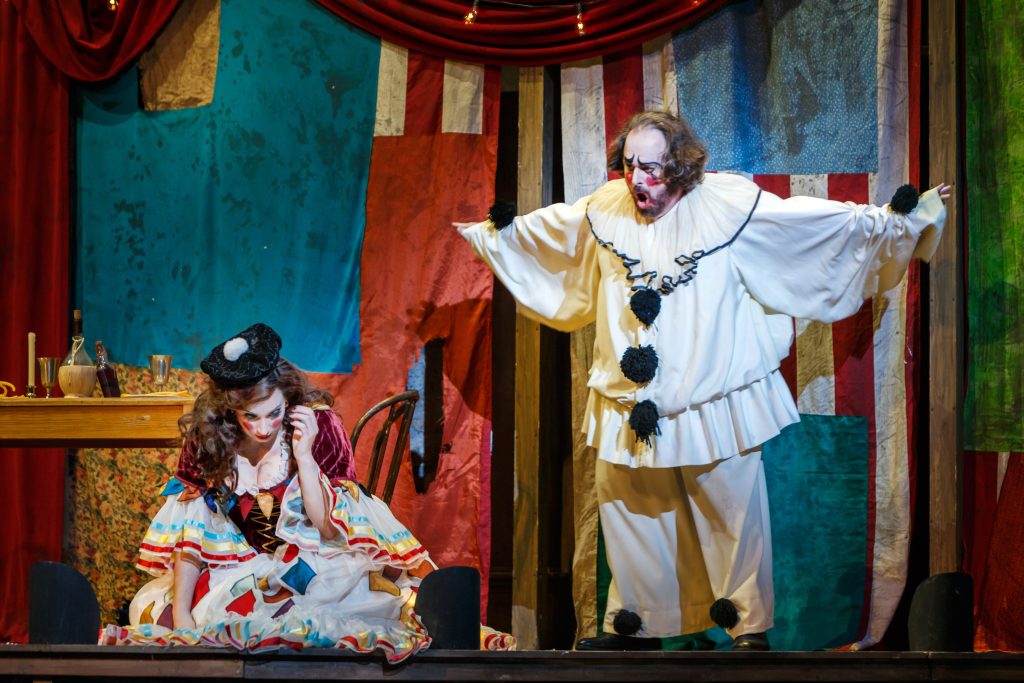
Nedda (Caitlin Gotimer) cowers to the demands of her husband Canio (Jonathan Burton) who is most certainly not clowning around in ‘Pagliacci.’
As a kid, fall weekends often started with a sleepover at a friend’s house. We’d stay up too late playing board games or just horsing around in the basement. When morning came, we’d have endless bowls of sugary cereal, walk to the drugstore for candy and then go to the movies for a double feature (which also included cartoons, a serial reel, and sometimes a yo-yo contest.) In fact, I don’t recall ever going to a Saturday matinee that wasn’t a double feature. I can still remember the stop-action animation of sword-fighting skeletons attacking Jason and The Argonauts or the herculean teams of Norsemen rowing The Long Ships. Everything about Saturdays was gluttonous. Never just one bowl of Sugar Pops, not just one Clark Bar or a single Reese’s Cup, and then, always, two movies and more. What joy! What sinful gluttony!
Such is the adult thrill of experiencing two operas in one evening. Pittsburgh Opera’s double feature of Cavalleria Rusticana and Pagliacci is a sweet treat for aficionados of soaring arias and serious orchestration.
Two for One
Often paired together for reasons of sharing an identical set filled with a secondary cast of common townsfolk, Cavalleria Rusticana and Pagliacci also share a style of operatic storytelling called verismo (as in verisimilitude) in which the librettist calls on everyday characters to fulfill the tragedy soon to unfold. There are no kings or princesses to confront their deserved comeuppances; no scheming divas or aristocratic asses to suffer their certain fate. In opera verismo, we experience the jealousy, adultery, greed and vengeance of common villagers going about their lives looking for love and, often with disastrous result, dealing with their destinies.
Cavalleria Rusticana, Pietro Mascagni’s best known opera, is the simple story of a young woman (Santuzza) whose one-time lover (Turrido) has been fooling around with a former lover, but now another’s newlywed bride (Lola). Santuzza confronts Turrido and begs him to stop the tryst, but is flatly rejected. Crestfallen, she informs the young groom (Alfio) who challenges Turrido to a duel. All of the action, which unfolds outside the village church on Easter, falls to the ears of Turrido’s mother, Mamma Lucia, whose sympathies are torn between celebrating the town’s favorite holy day or interfering in her son’s illicit affairs.
Ensemble Extraordinaire
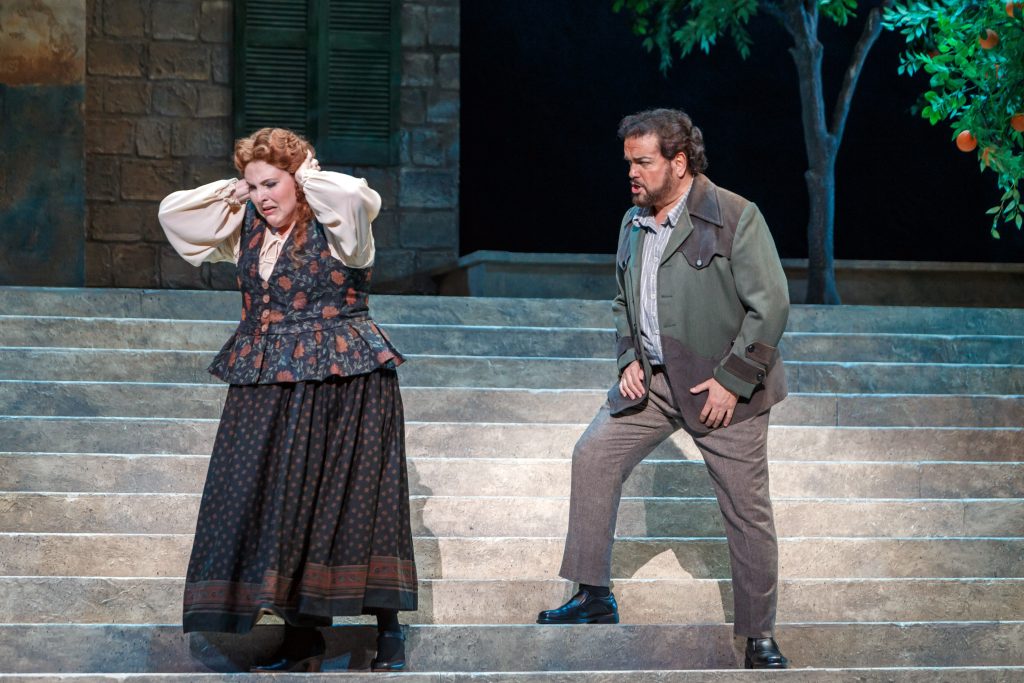
Santuzza (Eve Gigliotti) won’t hear what her former lover Turrido (Rafael Davila) has to say about her broken heart in ‘Cavalleria Rusticana.’
Eve Gigliotti, in her Pittsburgh Opera debut as Santuzza, takes the stage by sheer force of her compelling voice which is both fresh and full. She is a serious soprano playing a sincere Santuzza. As Mamma Lucia, Marianne Cornetti is a voice of great fidelity and effect. Mamma Lucia may not know the “full story,” but Cornetti knows her role cold and gives a truly warm and empathic performance. As Turrido, Rafael Davila (also in his debut with the Pittsburgh Opera) shines with less swagger than sensibility, while Sebastian Catana as Alfio offers his rich baritone to avenge both the honor of his wife, Lola, and his pride. Lola, as her name has come to imply, is a beauty who must offer a stage presence no less powerful than her voice. Audrey Welsh delivers both with polish and panache. This is a fine ensemble of well trained talent, yet what drives this short opera to an even higher level of satisfaction is the large cast that makes this Sicilian village lively. More than forty supernumeraries play various roles of school children, elders, priests, acolytes, and country women. Much of this talent is credited to the production’s chorus, yet also to the Pittsburgh Youth Chorus. Unlike smaller companies, Pittsburgh Opera is fortunate to fill its stage to full effect. (After all, great stories cannot “sail” without a crew and Jason would be no one—and nowhere—without his Argonauts!)
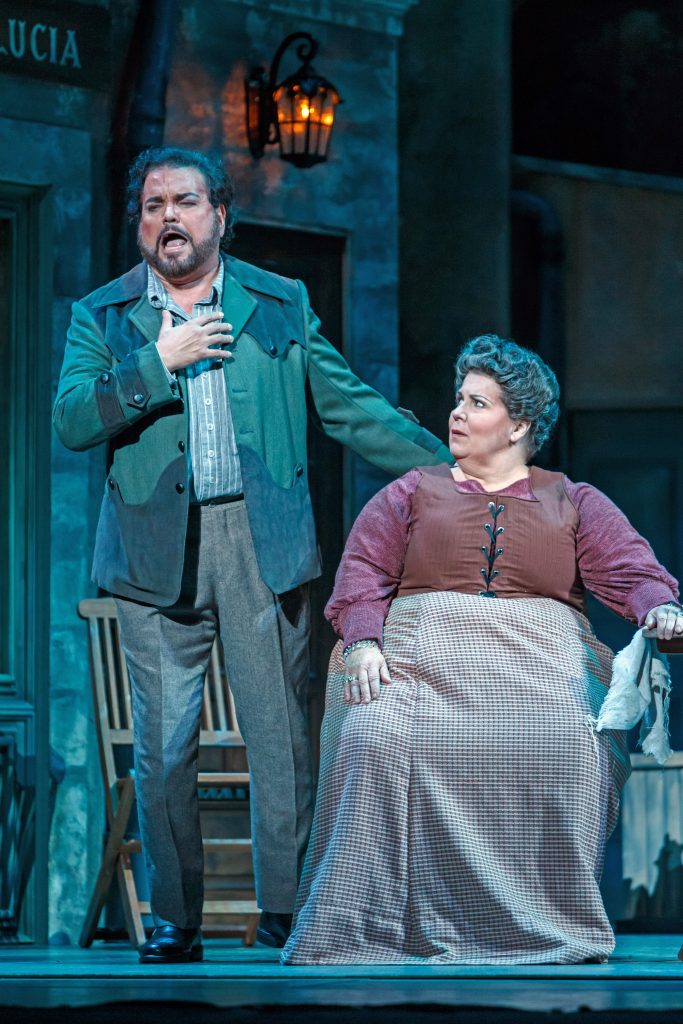
Turrido (Rafael Davila) confides in his mother, Mamma Lucia (Marianne Cornetti), that he can’t bare to lose his first love.
Don’t Trifle with the Truth
That same populated proscenium also works wonders in Pagliacci, Leoncavallo’s famous short opera wherein Canio the Clown cries the tears of a lovesick man brutally betrayed. Rare in operatic storytelling, Pagliacci begins with a prologue performed by one character. Tonio, a hunchbacked street actor, lets us know that the upcoming performance is about as real as it gets. This is a slice of life, he tells us, bitter but true. So, when the curtain rises, we immediately accept the honesty of a small town whose common folk are excited to attend a commedia dell’arte street performance that evening. In fact, we accept the truth because (however inadvertent to Leoncavallo’s libretto) we know this place and these paisan; they are all the same from our evening’s previous opera. And here, in the same town square, a troupe of traveling clowns have gathered to do what actors do best backstage: they gossip. Rumor has it, says Tonio, that Canio’s much younger wife, Nedda, has fallen for a handsome young villager. Canio tells his actors not to play around with innuendo; this is real life, he declares, and no one should trifle with his true love for Nedda. But Tonio takes advantage of his suspicions and blackmails Nedda for a kiss. Nedda defends herself forcefully. And, well—to make a short opera shorter—Tonio seeks revenge by spying on Nedda, learns the truth, and tells Canio. In an aria made famous in countless TV commercials, in Saturday cartoons, and in episodes of both “The Simpsons” and “Seinfeld,” Canio laments “Ridi, Pagliaccio,” the phrase that evokes the irony of a man who must “play the clown” even though his heart is breaking. Thus ends the first act.
In the second (and much shorter) act, the troupe of clowns put on their last performance for these townsfolk. The comedy they play is all too similar to the “real” story we have just seen unfold. And, without need for a spoiler alert, both the opera and the comedy-within-the-play come to a tragic ending.
Send in the Clowns
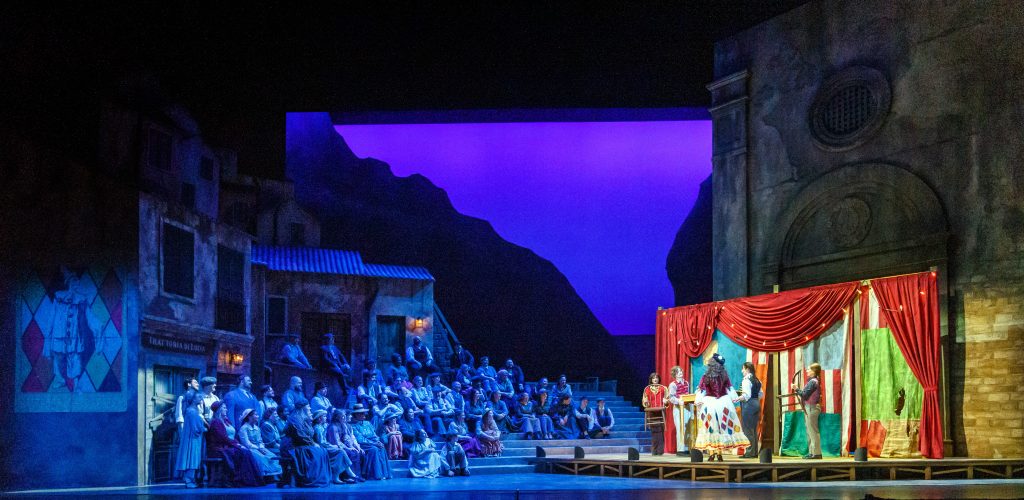
Village paisan await the scene change for a commedia dell’arte show soon to unfold. They may hope to laugh, but a great tragedy will bring down the “final curtain.”
Bravo Tonio, played heroically by Sebastian Catana (he who has just performed Alfio in Cavalleria Rusticana.) Catana is the only artist to perform dual roles in Pittsburgh Opera’s current double feature. A baritone that booms, Catana sets the professional level to which his company must all rise. And they do. Nedda, performed by Caitlin Gottimer, a celebrated alumna of Pittsburgh Opera’s resident company, is outstanding. And, in fact, she stands out of the crowd, decrying the freedom birds have that she does not, in an aria unlike any other in this evening’s presentation. It’s both joyous and sad; her soprano carries each beautifully.
Jonathan Burton, a favorite of Pittsburgh Opera and recent Cavaradossi in last month’s Tosca, polishes his plum role in Pagliacci as Canio. Audiences for Leoncavallo’s signature piece regularly anticipate the arietta of “Ridi, Pagliccio” and so it’s no easy piece to carry off without some sense of self-consciousness. Burton nailed it. Exceptional, too, are Fran Daniel Laucerica as Beppe/Arlecchino (also a standout in the recent Tosca) and Ricardo Jose Rivera as Silvio, debuting with the Pittsburgh Opera as the handsome young villager who’s attracted Nedda’s interest. And, without apology, again, the contributions of forty townsfolk who make the Benedum stage a true village and, in so doing, add inordinate value to the meaning of opera verismo cannot be underscored. In Pagliacci, several additional players also juggle, tumble, stilt-walk, dance and contort for the very effect a clown show adds to this circus. BooglepLex Circus is credited for this collective talent, deservedly so.
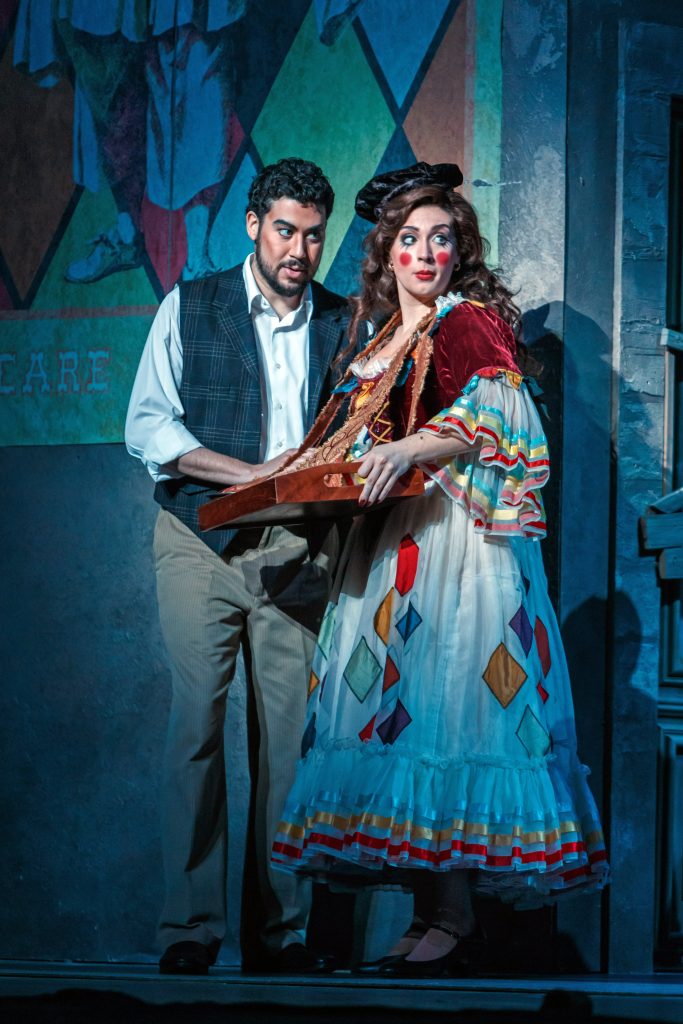
Silvio (Ricardo Jose Rivera) steals a moment with Nedda (Caitlin Gotimer) who has more to offer him than some circus souvenirs.
Bring Your Village
Pittsburgh Opera’s double-feature of “Cav / Pag” is no less than a gluttonous evening of rich music and soaring voice. Parents intending to enjoy this welcome evening should really consider bringing their teen children along with them for several reasons. First, it’s a double- feature and neither opera, both short and sweet, requires a preface of plot. Secondly, many who might never have attended any opera will likely know and enjoy these musical treats: the Intermezzo of Cavalleria Rusticana is part of the signature score of Scorcese’s Godfather: Part III, and the arietta “Ridi, Pagliaccio” is a cult fave. And last, but not least of all, Pittsburgh Opera’s production features an amazing set, including Italian villas, shopfronts, a cathedral, and town stairs gorgeously lit by a scrim of brilliant colors establishing sunsets and, well, time immemorial. Finally, they also offer tickets at just $15. There’s no such thing as a cineplex offering two movies (let alone a double feature) for less. And, yes, you can buy sugary treats, too. Pittsburgh Opera’s double feature of Cavalleria Rusticana and Pagliacci is onstage at the Benedum through November 17. The Sunday November 17 matinee performance offers free childcare for children two to twelve.
Bravo, Bravo
Offstage and in the orchestra pit talent abounds in this production. Conductor Antony Walker and the Pittsburgh Opera orchestra are exceptional. Unto themselves, without a cast, they are worth the evening’s ticket. Both operas are stage directed by Daniel Rigazzi. Scenic design is by Steven C. Kemp. Edward Kotanen designed costumes and James Geier designed wigs and make-up. The lighting designer is Cindy Limauro. Cindy Knight managed the stage, with the assistance of Bee Anderson and Tess Naval. Chorus master is Mark Trawka.
Photos: David Bachman Photography for Pittsburgh Opera.
C. Prentiss Orr is a Pittsburgh-based writer who covers theater and other topics for Entertainment Central. He is the author of the books The Surveyor and the Silversmith and Pittsburgh Born, Pittsburgh Bred.
Share on Social Media
Follow Entertainment Central
Latest Stories
Sign up for the EC Newsletter







